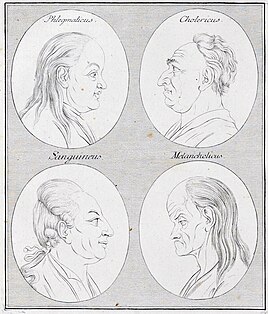Neurosis is a class of functional mental disorders involving chronic distress but neither delusions nor hallucinations. The term is no longer used by the professional psychiatric community in the United States, having been eliminated from the Diagnostic and Statistical Manual of Mental Disorders in 1980 with the publication of DSM III. It is still used in the ICD-10 Chapter V F40–48.

The Myers–Briggs Type Indicator (MBTI) is an introspective self-report questionnaire with the purpose of indicating differing psychological preferences in how people perceive the world around them and make decisions.
In psychology, trait theory is an approach to the study of human personality. Trait theorists are primarily interested in the measurement of traits, which can be defined as habitual patterns of behavior, thought, and emotion. According to this perspective, traits are aspects of personality that are relatively stable over time, differ across individuals, are relatively consistent over situations, and influence behavior. Traits are in contrast to states, which are more transitory dispositions.

Graig Nettles, nicknamed "Puff", is an American former Major League Baseball third baseman. During a 22-year baseball career, he played for the Minnesota Twins (1967–1969), Cleveland Indians (1970–1972), New York Yankees (1973–1983), San Diego Padres (1984–1986), Atlanta Braves (1987), and Montreal Expos (1988).

The Big Five personality traits, also known as the five-factor model (FFM) and the OCEAN model, is a taxonomy for personality traits. It is based on common language descriptors. When factor analysis is applied to personality survey data, some words used to describe aspects of personality are often applied to the same person. For example, someone described as conscientious is more likely to be described as "always prepared" rather than "messy". This theory is based therefore on the association between words but not on neuropsychological experiments. This theory uses descriptors of common language and therefore suggests five broad dimensions commonly used to describe the human personality and psyche.
The Wonderlic Personnel Test is a popular group intelligence test used to assess the aptitude of prospective employees for learning and problem-solving in a range of occupations. The Wonderlic is available in 12 different languages and is often used in college, entry level jobs, and team-making efforts. It consists of 50 multiple choice questions to be answered in 12 minutes. The test was developed by Eldon F. Wonderlic, while he was a graduate student at Northwestern University. The score is calculated as the number of correct answers given in the allotted time. A score of 20 is intended to indicate average intelligence. Wonderlic, Inc. claims a minimum score of 10 points suggests a person is literate. A new version was released in January 2007 called the Wonderlic Contemporary Cognitive Ability Test, containing questions more appropriate to the 21st century; it is available both online and in printed form, whereas the original test is only available on paper. The Wonderlic test was based on another test called the Otis Self-Administering Test of Mental Ability.
Newcastle University Medical School is the medical school at Newcastle University in England. It was established in 1834 in the city of Newcastle upon Tyne and served as the College of Medicine in connection with Durham University from 1851 to 1937 when it joined Armstrong College, to form King's College, Durham. In 1963 King's College became the University of Newcastle upon Tyne. The university now uses the name "Newcastle University".
Psychological evaluation is defined as a way of assessing an individual's behavior, personality, cognitive abilities, and several other domains. The purpose behind many modern psychological evaluations is to try to pinpoint what is happening in someone's psychological life that may be inhibiting their ability to behave or feel in more appropriate or constructive ways; it is the mental equivalent of physical examination. Other psychological evaluations seek to better understand the individual's unique characteristics or personality to predict things like workplace performance or customer relationship management.
The trait of extraversion–introversion is a central dimension of human personality theories. The terms introversion and extraversion were popularized by Carl Jung, although both the popular understanding and psychological usage differ from his original intent. Extraversion tends to be manifested in outgoing, talkative, energetic behavior, whereas introversion is manifested in more reserved and solitary behavior. Virtually all comprehensive models of personality include these concepts in various forms. Examples include the Big Five model, Jung's analytical psychology, Hans Eysenck's three-factor model, Raymond Cattell's 16 personality factors, the Minnesota Multiphasic Personality Inventory, and the Myers–Briggs Type Indicator.
The Revised NEO Personality Inventory is a personality inventory that examines a person's Big Five personality traits. In addition, the NEO PI-R also reports on six subcategories of each Big Five personality trait.
Reinforcement sensitivity theory (RST) proposes three brain-behavioral systems that underlie individual differences in sensitivity to reward, punishment, and motivation. While not originally defined as a theory of personality, the RST has been used to study and predict anxiety, impulsivity, and extraversion. The theory evolved from Gray's biopsychological theory of personality to incorporate findings from a number of areas in psychology and neuroscience, culminating in a major revision in 2000. The revised theory distinguishes between fear and anxiety and proposes functionally related subsystems. Measures of RST have not been widely adapted to reflect the revised theory due to disagreement over related versus independent subsystems. Despite this controversy, RST informed the study of anxiety disorders in clinical settings and continues to be used today to study and predict work performance. RST, a continuously evolving paradigm, is the subject of multiple areas of contemporary psychological enquiry.
Individual psychological assessment (IPA) is a tool used by organizations to make decisions on employment. IPA allows employers to evaluate and maintain potential candidates for hiring, promotion, and development by using a series of job analysis instruments such as position analysis questionnaires (PAQ), occupational analysis inventory (OAI), and functional job analysis (FJA). These instruments allow the assessor to develop valid measures of intelligence, personality tests, and a range of other factors as means to determine selection and promotion decisions. Personality and cognitive ability are good predictors of performance. Emotional Intelligence helps individuals navigate through challenging organizational and interpersonal encounters. Since individual differences have a long history in explaining human behavior and the different ways in which individuals respond to similar events and circumstances, these factors allow the organization to determine if an applicant has the competence to effectively and successfully do the work that the job requires. These assessments are administered throughout organizations in different forms, but they share one common goal in the selection process, and that is the right candidate for the job.
Some debates have pervaded the field of psychology since its genesis. Perhaps one of the most salient ones deals with the nature of personality. Personality psychology studies one's distinctive style of cognition, behavior, and affect. However, this concept elicits discord among psychologists as some have insisted that it does not exist, while others struggle with issues of measurement.
The Big Five Aspect Scales is a personality test further elaborating upon the big five personality traits test model. It adds two "aspects" to each trait. Aspects represent a level of precision between the big five personality traits and the facets of the Revised NEO Personality Inventory. The scales are public domain. The five personalities that make up the aspect scales are Openness, Conscientiousness, Agreeableness, Extraversion, and Neuroticism.

The biological basis of personality is the collection of brain systems and mechanisms that underlie human personality. Human neurobiology, especially as it relates to complex traits and behaviors, is not well understood, but research into the neuroanatomical and functional underpinnings of personality are an active field of research. Animal models of behavior, molecular biology, and brain imaging techniques have provided some insight into human personality, especially trait theories.
Intelligence and personality have some common features; for example, they both follow a relatively stable pattern throughout the whole of an individual’s life, which is genetically determined in different degrees. In addition, they are both significant predictors of various outcomes, such as educational achievement, occupational performance, and health. However, the traditional view in psychology is that there is no meaningful relationship between personality and intelligence and they should be studied as separate entities.
Daniel Nettle is a British behavioural scientist, biologist and social scientist. He is notable for his research that integrates psychology with evolutionary and comparative biology. After obtaining a BA in Psychology and Philosophy at Oxford University, Nettle went on to complete a PhD in Biological Anthropology at University College London. He is now a Professor of Behavioural Science at Newcastle University.




